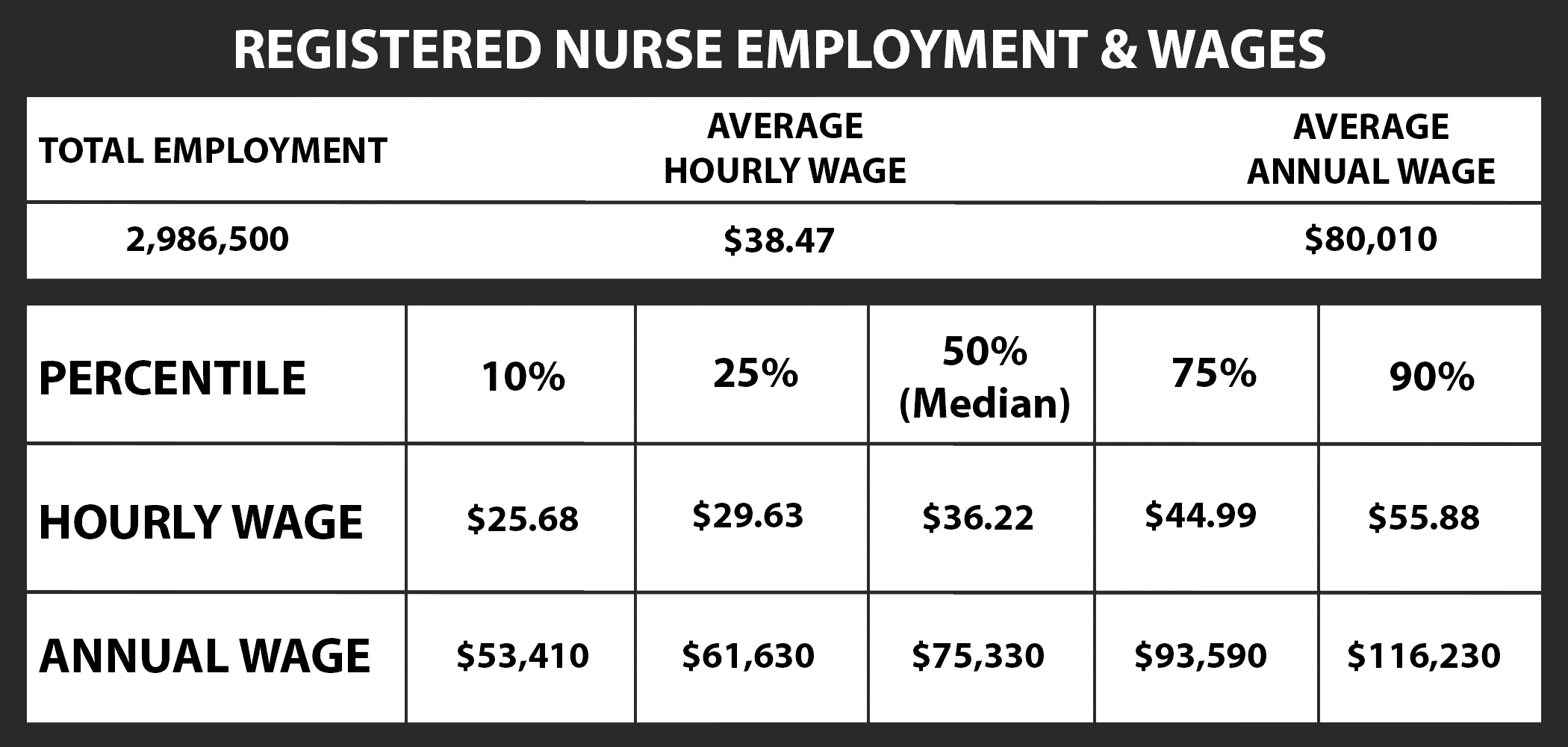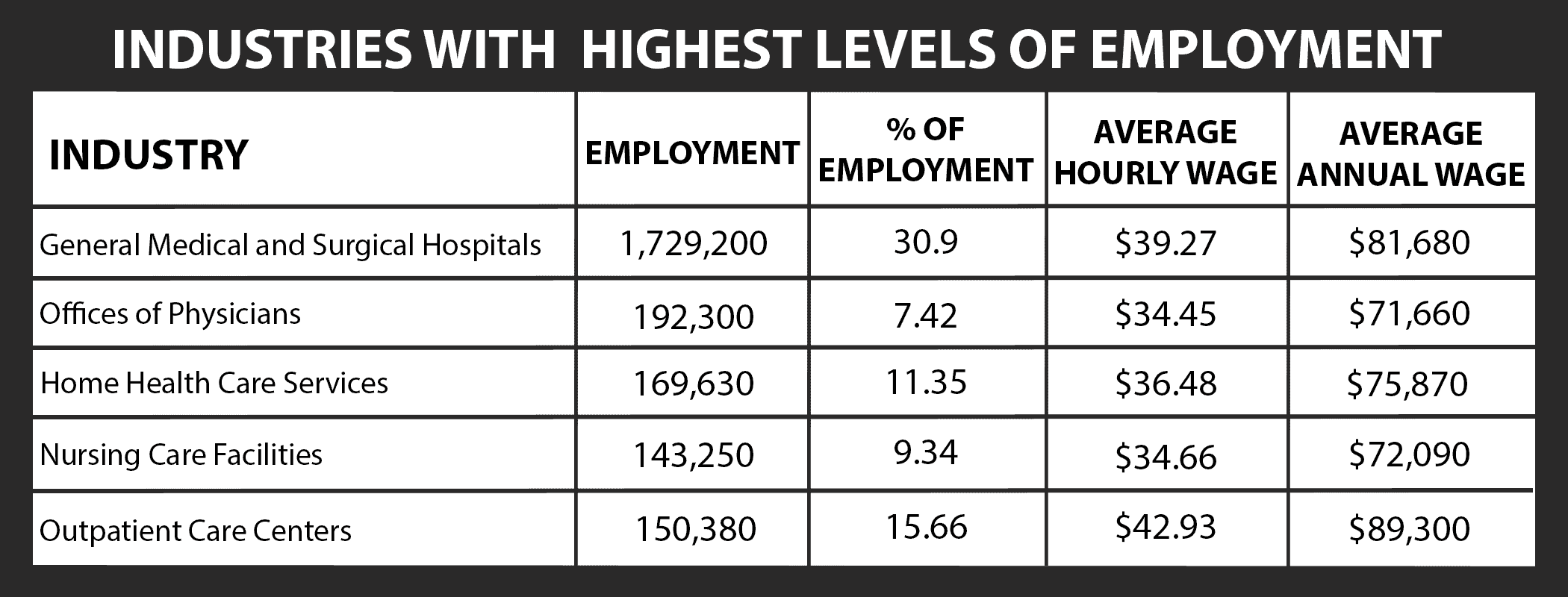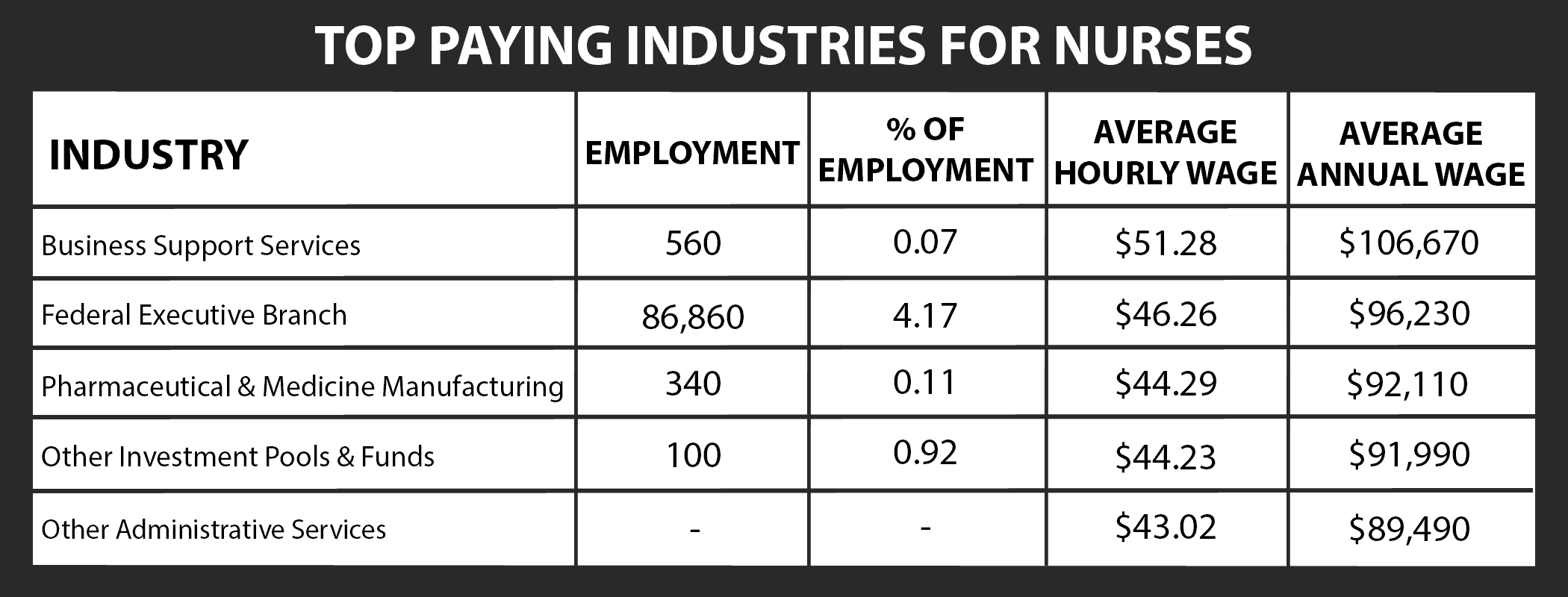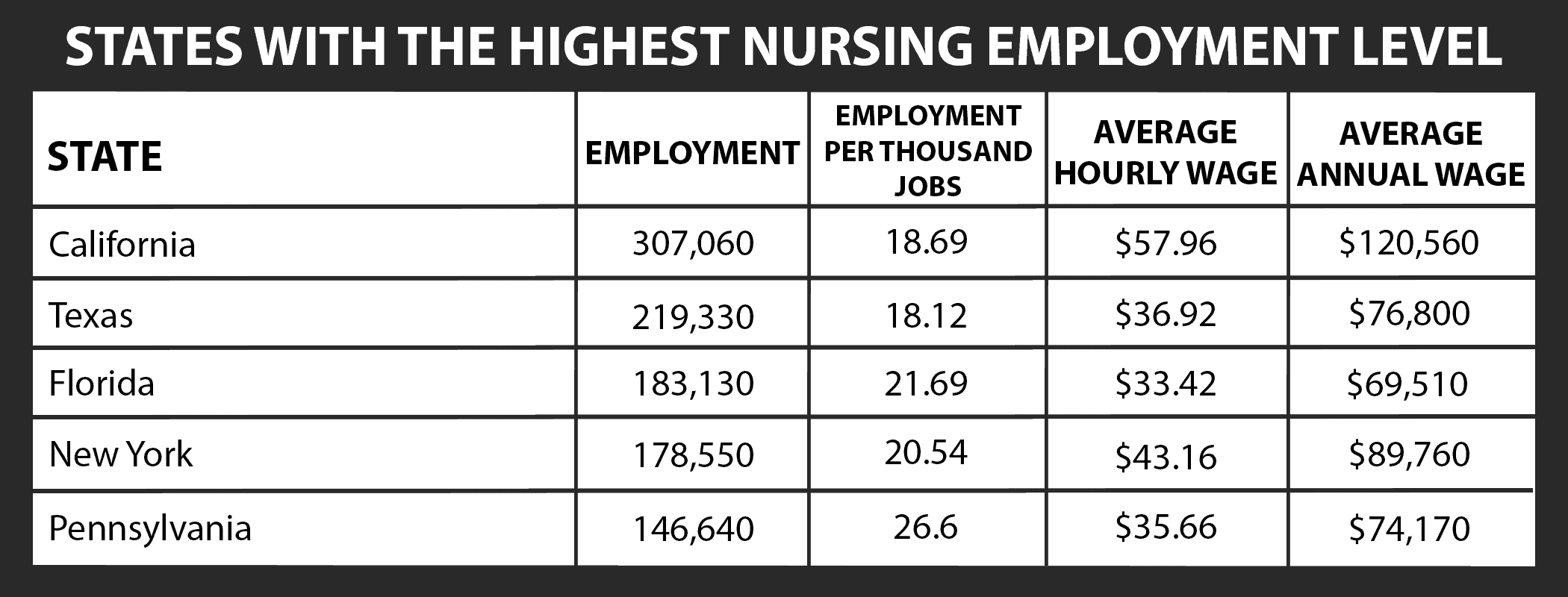– As of May 2020, there were roughly 3,080,100 employed Registered Nurses.
– More than 1,729,200 Registered Nurses were employed in General Medical and Surgical Hospitals.
– The state of California has the highest level of employed RNs at 307,060.
There are nearly 3 million employed nurses in the country. Nurses are a highly valued and respected part of the medical field. There is always a high demand for nurses and that demand continues to grow. The employment of Registered Nurses is projected to grow by 9% by 2030, which is on par with average job growth.
Nurses provide care to patients while observing, assessing, and recording their symptoms, reactions, and progress; all of these recordings help provide the basis for care planning and intervention for that patient.
If you want to become a nurse, you’re probably wondering about the job requirements as well as how much a nurse makes.
What are the Responsibilities of a Nurse?
Nurses are very important when it comes to the healthcare field. They work in a variety of areas and depending on which department or specialty you work in, your job duties can vary.
Nurses are not limited to only working in hospitals. They can also work in schools, clinics, assisted living facilities or homes, and more. Nurses can also specialize in different areas such as family practice, cardiac care, emergency nursing, and labor and delivery.
No matter what area or specialty you work in as a nurse, there are a few daily responsibilities that are consistent.
- Monitor and record patient progress
- Monitor and record patient vital signs
- Create care plans for patients
- Assist with procedures
- Administer medications and treatment
- Administer and monitor IV medication
- Perform wound and skincare
- Draw blood and collect lab work
- Educate patients and answer their questions
To be successful as a nurse, there are several skills that you’ll need to have:
- Professionalism
- Attention to detail
- Compassion
- Critical thinking
- Time management
- Excellent communication skills
Nurse Work Environment
Many nurses work in hospitals, home health, public health, as well as in schools and community centers, and many other facilities. About 60% of nurses work for a state, local, or private hospital.
Your work environment will vary depending on where you work. Nonetheless, you’ll be on your feet walking and standing for a good part of your day. You will also spend a lot of time bending and stretching.
You’ll also be in close contact with people who may have infectious diseases so it’s important for nurses to follow strict guidelines to protect themselves.
Many nurses work rotating shifts so you must be flexible in your schedule and able to work irregular schedules such as on weekends and holidays.
How to Become a Nurse
- If you’ve decided to become a nurse, there are three different educational paths that can be taken.
- Diploma from an approved nursing program
- Associate’s degree in Nursing
- Bachelor’s degree in Nursing
While there are three types of education programs, having a bachelor’s degree can land you a job much easier and can broaden your employment prospects.

Once you’ve graduated with your nursing degree, you’ll be required to take and pass the NCLEX exam. Passing the NCLEX exam is the most important part of becoming a nurse; it’s required for any prospective nurse.
The NCLEX exam determines if you’re ready to begin practicing as an entry-level nurse. The NCLEX exam tests the knowledge you learned in school and you will be tested on how you use critical thinking skills to make nursing judgments.
How Much Does a Nurse Make?
According to BLS.gov, as of 2020, nurses made an average of $75,330 per year or $36.22 per hour. The lowest 10% of nurses make less than $53,410 while the highest 10% earned more than $116,230. The top-paying industry for a nurse is within Business Support Services, which can be anything including administrative and support services with average annual earnings of $106,670.
What is the Projected Job Growth for Nurses?
According to BLS.gov, the job growth for a nurse is projected to be 9% through 2030, which is considered an average growth rate.
Nursing Pay – Nurse Employment and Wages
The total employment for nurses across the United States is 2,986,500. The average hourly wage is $38.47 and the average annual wage is $ 80,010 per year.

Bottom 10%:
Average Hourly Wage: $25.68
Average Annual Wage: $53,410
25%:
Average Hourly Wage: $29.63
Average Annual Wage: $61,630
50%:
Average Hourly Wage: $36.22
Average Annual Wage: $75,330
75%:
Average Hourly Wage: $44.99
Average Annual Wage: $93,590
Top 90%:
Average Hourly Wage: $55.88
Average Annual Wage: $116,230
Industries With the Highest Levels of Nursing Employment

General Medical and Surgical Hospitals
1,729,200 total nurses employed with 30.90% of employment in the industry.
Average annual wage of $81,680 with an average hourly wage of $39.27.
Offices of Physicians
192,300 total nurses employed with 7.42% of employment in the industry.
Average annual wage of $71,660 with an average hourly wage of $34.45.
Home Health Care Services
169,630 total nurses employed with 11.35% of employment in the industry.
Average annual wage of $75,870 with an average hourly wage of $36.48.
Nursing Care Facilities (Skilled Nursing Facilities)
143,250 total nurses employed with 9.34% of employment in the industry.
Average annual wage of $72,090 with an average hourly wage of $34.66.
Outpatient Care Centers
150,380 total nurses employed with 15.66% of employment in the industry.
Average annual wage of $89,300 with an average hourly wage of $42.93.
Areas With Highest Concentration of Nurse Employment
General Medical and Surgical Hospitals
1,729,200 total nurses employed with 30.90% of employment in the industry.
Average annual wage of $81,680 with an average hourly wage of $39.27.
Specialty (except Psychiatric and Substance Abuse) Hospitals
63,910 total nurses employed 23.93% of employment in the industry.
Average annual wage of $82,910 with an average hourly wage of $39.86.
Psychiatric and Substance Abuse Hospitals
39,840 total nurses employed 16.47% of employment in the industry.
Average annual wage of $77,250 with an average hourly wage of $37.14.
Outpatient Care Centers
150,380 total nurses employed 15.66% of employment in the industry.
Average annual wage of $89,300 with an average hourly wage of $$42.93.
Home Health Care Services
169,630 total nurses employed with 11.35% of employment in the industry.
Average annual wage of $75,870 with an average hourly wage of $36.48.
Top Paying Areas for Nurses

Business Support Services
560 / 0.07% total employment.
Average annual wage of $106,670 with a $51.28 hourly wage.
Federal Executive Branch
86,860 / 4.17% total employment.
Average annual wage of $96,230 with a $46.26 hourly wage.
Pharmaceutical and Medicine Manufacturing
340 / 0.11% total employment.
Average annual wage of $92,110 with a $44.29 hourly wage.
Other Investment Pools and Funds
100 / 0.92% total employment.
Average annual wage of $91,990 with a $44.23 hourly wage.
Office Administrative Services
Average annual wage of $89,490 with a $43.02 hourly wage.
States with Highest Nurse Employment

California
307,060 / 18.69% total employment
Average annual wage $120,560 / $57.96 hourly wage
Texas
219,330 / 18.12% total employment
Average annual wage $76,800 / $$36.92 hourly wage
Florida
183,130 / 21.69% total employment
Average annual wage $69,510 / $33.42 hourly wage
New York
178,550 / 20.54% total employment
Average annual wage $89,760 / $43.16 hourly wage
Pennsylvania
146,640 / 26.60% total employment
Average annual wage $74,170 / $35.66 hourly wage
Additional Nursing Resources:

